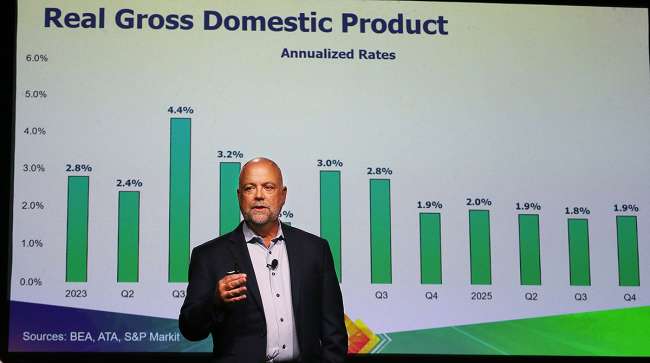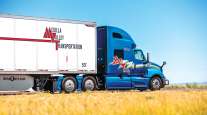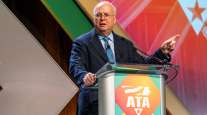Staff Reporter
ATA Economist Anticipates Freight Market Rebalancing Pains

[Stay on top of transportation news: Get TTNews in your inbox.]
NASHVILLE, Tenn. — American Trucking Associations Chief Economist Bob Costello on Oct. 14 highlighted how the freight market is set to slowly improve as equipment and demand rebalance.
“I think you’re going to be not thrilled with my presentation, but you’re not going to go away depressed either,” Costello said. “It’s not easy folks, every cycle is different, this one included. I feel like we’ve been a little snakebitten. We think this thing is going to turn around and so forth. But my theme today is really sort of back to normal. We haven’t seen normal since what, pre-pandemic.”
Costello made his comments during a breakfast session at the 2024 ATA Management Conference & Exhibition. He pointed out that the general economy has been slowing despite its overall resilience but also anticipates that the main drivers of truck freight aren’t going to get much worse despite that.
“It’s far from robust,” Costello said. “But even though the macro economy is going to slow back to normal, I actually think that the drivers of truck freight are going to get a little bit better.
They say breakfast is the most important meal of the day and that’s especially true when it’s with Bob Costello!
Bob provided valuable insights into current economic and trucking industry trends, along with his outlook for the future. Thank you to everyone who joined us for… pic.twitter.com/6S52EW8mg4 — American Trucking (@TRUCKINGdotORG) October 14, 2024
“One of the things a lot of people have underestimated is just how important the factory sector is to freight. And it’s one of the reasons why freight has been pretty slow. Because manufacturing activity, really the lack thereof, has hurt volumes this year. I think it’s going to get a little bit better.”
The fed funds rate going to 5% also contributed to current economic conditions by impacting housing and construction activity. Costello noted that nonresidential projects have been strong, but housing activity has been really tough. He also pointed to consumer behavior trending heavily in favor of experiences and services at the expense of goods. But he also noted that the data is already showing that is going back to normal.
“We’ve already seen one rate decrease, and so that’ll help a little bit,” Costello said. “The Fed will continue to decrease interest rates at a moderate pace. That will all help, just understand two things: It takes a long time for both increases in the fed funds rate and decreases to work their way through the economy, and mortgage rates have already fallen a fair amount. So that’s going to slow or go down at a slower pace.”
Costello added that historically the gross domestic product has been around 2%. That’s the total value of all goods and services after the effects of inflation. But it has trended well above that with the exception of one quarter since the start of 2023. The second quarter of this year came in at 3% on an annualized rate. Costello expects Q3 to be 2.8% before going back to normal.
“How are we expected to get a little bit better if the macroeconomy is slowing down?” Costello said. “Remember, these strong numbers, we didn’t partake in that. We’ve been in a recession during a time when the macroeconomy grew. Over 60% of what’s embedded in these numbers are services. We need to look at the goods side of the economy and that’s where things have changed a little bit.”
Costello expects the trucking industry to slowly start improving rather than seeing a boom in activity. He pointed to the spot market, which has seen demand and rates collapse during the freight recession. He also noted that a pull toward private fleets has not helped.
“One of the reasons why freight hasn’t recovered as much is because private fleets have taken some of the share, which by the way has not happened in a very long time,” Costello said. “I do think longer term, the more they grow those private fleets and all of a sudden, they’re going to have some of the issues that you for-hire companies have.”
Want more news? Listen to today's daily briefing above or go here for more info
Costello noted that the trucking industry also has struggled with stagflation in that rates and demand are down while costs are up, and that has been the reason for the freight recession. This has been driven by an imbalance in the supply of capacity versus freight demand because there is far more equipment than there is cargo to carry.
“I do think supply is coming out, but there’s got to be more and I think more will be coming even if freight picks up a little bit,” Costello said. “Because the costs have been so difficult, there’s been some fleets out there who have been like, we’ve got to cut back on our costs. We’ve seen it in a lot of different ways including not reinvesting or spending money on preventative maintenance and so forth. That’s eventually going to catch up with those fleets.”





